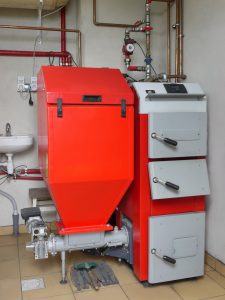 When an icy chill hits and its time to get some heat into the home, you’re probably only thinking of one thing: the setting on the thermostat. Few people actually take the time to think about what processes actually move that heat into the home and how their heaters really work—and that’s okay!
When an icy chill hits and its time to get some heat into the home, you’re probably only thinking of one thing: the setting on the thermostat. Few people actually take the time to think about what processes actually move that heat into the home and how their heaters really work—and that’s okay!
For the most part, it’s not up to you to know how a heater works, as a qualified technician will have the information necessary to make any repairs and only an installer is experienced enough to put in a new heater properly. However, there is one thing we think any new homebuyer should know, or anyone purchasing a replacement heater: the difference between a boiler and a furnace.
The Most Common Systems Around: Furnaces
Furnaces are known as forced-air systems, as are heat pumps and central air conditioners. This means they heat up the air before sending it out into a room, and that air is what transfers heat to you.
They may use electricity to generate heat, but this can be costly in some colder climates, depending on the cost of electricity. That’s why natural gas is the most common way to generate heat. A pilot flame remains lit and lights the burner when the thermostat calls for heat.
Today’s furnaces have many benefits. They are safer than ever, with most modern engineering forgoing standing pilots in favor of electronic ignition systems. They also tend to cost a lot less than the boiler, and most homes are already set up for their installation.
The Efficiency of Hot Water Heating: Boilers
Boilers are known as radiant heating systems, and this process works a lot differently than forced-air heating. A boiler also has gas burners that ignite as needed, but from there the process differs.
Heat is exchanged to a large tank of water. Circulator pumps bring the water around the home, either to underground pipes snaking all around the floors or to endpoints like radiators.
Boilers manufactured today are also quite safe, especially when compared to those built decades ago. They last quite a long time, and you’ll likely notice the energy and fuel savings quickly adding up! The savings you can see with a high-efficiency boiler is unlike anything you’ll see with any other fuel-burning system.
So Which Is Better?
This is a question we cannot always answer for you. In a home with existing ductwork, a boiler may be an unnecessary expense that involves major renovations. However, if you are renovating a home anyway or installing a new heater in a new home, this may be a welcome addition.
A boiler offers unrivaled comfort, savings, and durability. Many people say that they can never go back to forced-air heating after feeling the difference that comes with a high-efficiency boiler, which tends to require little maintenance as well. However, a furnace is still a solid choice for any home, particularly if you’re not looking to make any major investments.
For installation and more information about boiler service in North Valley, NM, contact Axiom Home Services, Inc.

